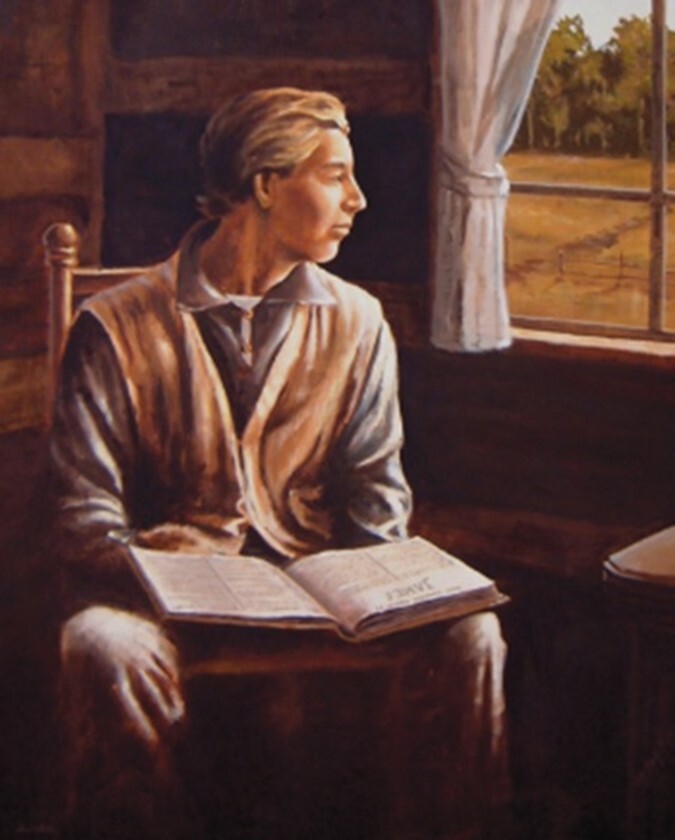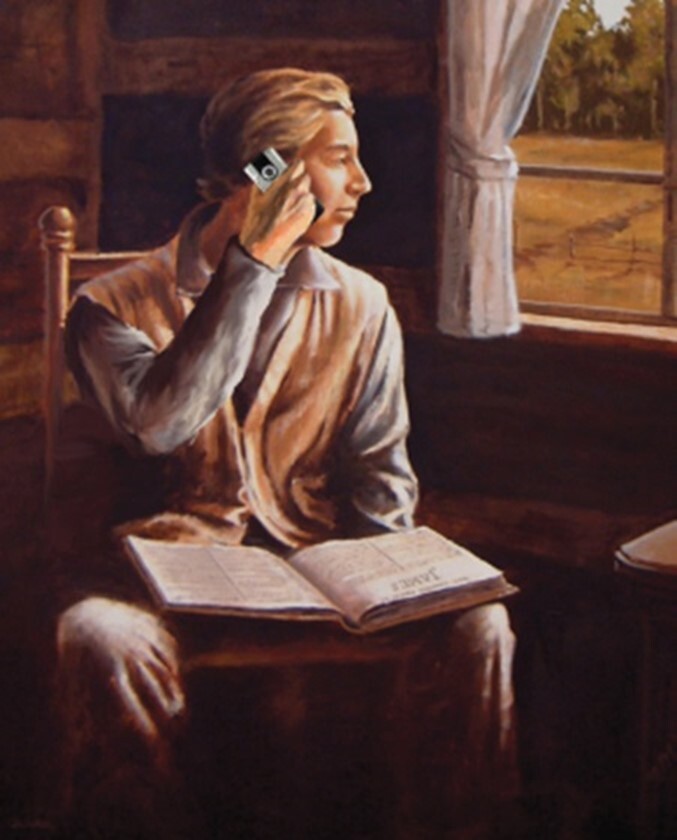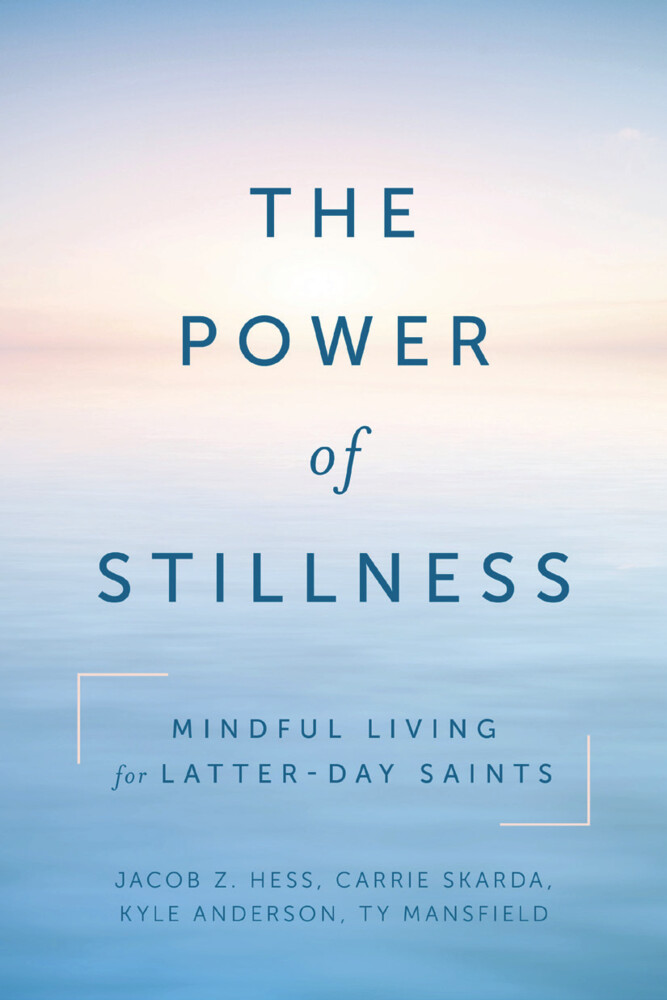We all know how Joseph Smith read James 1:5 and deeply pondered on the verse until it sunk deep into his heart. But what if this:

Were replaced by this?

Gratefully, cell phones weren’t a distraction from revelation Joseph Smith faced in his life. But I know that distractions by technology are a real problem today. For example, I just finished studying my scriptures and multiple times felt myself drawn to interruptions on my phone. What messages might I miss from heaven if I give in to distractions?
Another Example of Doing Less
Let’s look at one more powerful moment of revelation in scripture. In Helaman 9, the prophet Nephi performs an incredible miracle. But immediately, the people began to debate whether he was a prophet, and eventually, Nephi was left by himself. Next, we read, “And it came to pass that Nephi put on his headphones and went his way towards his own house, listening to some of his favorite pop music so that he could relax after that stressful experience.”
No wait, that’s not what it says. The verse actually says that Nephi, “went his way towards his own house, pondering upon the things which the Lord had shown unto him. And it came to pass as he was thus pondering—being much cast down because of the wickedness of the people…and it came to pass as he was thus pondering in his heart, behold, a voice came unto him saying: Blessed art thou, Nephi, for those things which thou hast done…” (Helaman 10:2–4, emphasis added)
Nephi would go on to receive one of the greatest revelations of all times, and he would be given the sealing power. That is incredible! Would it have happened if he had been distracted?
Christ’s Example of Seeking Stillness
Both Nephi and Joseph Smith had powerful spiritual experiences because they took time to be still, time to pray, ponder, and receive revelation. Recently, I reread The Power of Stillness and was reminded of the spiritual value of taking time for solitary prayer and pondering. Consider this series of examples from the Savior's life:
- “Crowds of people came to hear him and to be healed of their sicknesses. But Jesus often withdrew to lonely places and prayed.” (Luke 5:16–17, New International Version).
- When Christ had some big decisions to make, “he went out into a mountain to pray, and continued all night in prayer to God” (Luke 6:12).
- “So many people were coming and going that they did not even have a chance to eat…[So Jesus told his disciples] ‘Come with me by yourselves to a quiet place and get some rest.’ So they went away by themselves in a boat to a solitary place” (Mark 6:31–32, New International Version).
Repeatedly we see Jesus Christ seeking solitude, finding extended periods for stillness, for pondering and communing with God.
What if We Sought Stillness in Our Own Lives?
I recently had an experience where the power of stillness hit home. I participated in an interfaith exchange, where I spent two days living at a Catholic seminary. (In the Catholic tradition, a seminary is a college environment, where priests are training to become full-time priests with the Catholic Church.)
I was invited to join in the evening prayer service. It started like a normal church service with a prayer, singing, and some brief remarks. Then the person in charge said, “We will now take some time for personal prayer,” and everyone knelt down. I assumed that it would be quiet for two or three minutes, but the time allotted for personal prayer was 30 minutes. It was amazing. We were all just in the chapel, it was completely quiet, and everyone was praying. I'll be honest, I wasn't used to hearing quiet for that long!
I’m the first to admit it can be hard to carve out five minutes for pondering in solitude, but what spiritual blessings might we find if we found a way to push pause and take time to be still?
President Gordon B. Hinckley taught,
“We live in a very mad world when all is said and done. The pressures are tremendous. We fly at high speeds. We drive at high speeds. We program ourselves. . . . But there is hardly time to reflect and think and pause and meditate. I daresay that most of those in this room today have not taken an hour in the last year to just sit down quietly, each [one individually] . . . reflecting upon his place in this world, upon his destiny, upon his capacity to do good, upon his mission to make some changes for good. We need to. I recall so vividly President McKay in his old age in a meeting with his counselors and the Twelve saying, ‘Brethren, we do not spend enough time meditating.’ “I believe that with all my heart.” (As quoted in The Power of Stillness, 19)
Sometime soon—maybe right now, maybe later today, could you and I turn off the music, put away the phone, and take time to be still, to ponder, and to pray? As we do, we will receive the blessings recently promised by President Russell M. Nelson: “Quiet time is sacred time—time that will facilitate personal revelation and instill peace.”
The Power of Stillness
Related articles
▶ Expert tips for enjoying spiritual stillness—no matter what’s on your plate
▶ The most productive thing you can do for your testimony is also the simplest
▶ 4 signs of the Second Coming that will fill you with hope
▶ Watch: Adorable 11-year-old plays the organ for his ward


